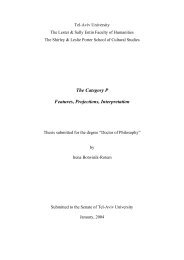Create successful ePaper yourself
Turn your PDF publications into a flip-book with our unique Google optimized e-Paper software.
TEL AVIV UNIVERSITY REVIEW<br />
Summer 2010<br />
to the skills they utilized in the game,<br />
such as memory, spatial learning <strong>and</strong><br />
motor learning.<br />
“The changes probably fade over<br />
time,” clarifies Assaf. “It depends on<br />
the intensity of the experience.” It also<br />
depends on how many times someone<br />
engages in a specific task: In the process<br />
of learning, the brain forms new<br />
connections that can either fade or be<br />
refreshed over the course of time by<br />
repeated use.<br />
“We’re now attempting to find out<br />
how persistent the structural change<br />
is,” says Assaf. “When we re-test our<br />
subjects with the same racing game a<br />
week later, it takes them some time to<br />
achieve the score they made a week<br />
earlier.”<br />
One of the possible implications of<br />
Assaf’s research is that scientists may<br />
one day be able to predict an individual’s<br />
future susceptibility to neurodegenerative<br />
diseases by identifying<br />
a deficiency of plasticity in their brain<br />
at a young age.<br />
A Meeting of Minds:<br />
Philosophy <strong>and</strong><br />
Psychotherapy<br />
The philosopher asks: What’s it all<br />
about? The therapy patient asks – not<br />
unsurprisingly – the very same thing,<br />
says Prof. Shlomo Mendelovich, Head<br />
of the Psychotherapy Program at TAU.<br />
“The meaning of things, the meaning<br />
of being, the importance of suffering<br />
in human existence – these are<br />
topics of concern to both philosophy<br />
<strong>and</strong> psychology, which makes them<br />
ideally suited to be studied in an interdisciplinary<br />
manner,” Mendelovich<br />
says. “In a sense, psychotherapy is like<br />
practical philosophy.”<br />
In a popular interdisciplinary<br />
course this year, master’s students<br />
in philosophy at the Entin Faculty<br />
of Humanities <strong>and</strong> graduates of the<br />
Psychotherapy Program at the Sackler<br />
Faculty of Medicine jointly explored<br />
the concept of truth <strong>and</strong> its relationship<br />
with tradition <strong>and</strong> memory. The<br />
course, “Readings in Freud: Moses<br />
<strong>and</strong> Monotheism,” was co-organized<br />
by Prof. Shlomo Biderman, Dean of<br />
Humanities, <strong>and</strong> Dr. Rina Lazar of<br />
the Psychotherapy Program, <strong>and</strong> was<br />
held under the auspices of the School<br />
of Philosophy. Prominent TAU professors<br />
of philosophy <strong>and</strong> psychotherapy<br />
were invited to give lectures.<br />
“The two disciplines don’t quite<br />
speak the same language,” notes<br />
Lazar, “which makes the course a very<br />
provocative <strong>and</strong> evocative experience.<br />
We learn from them, they learn from<br />
us. In psychotherapy, we clinicians<br />
want to help people who are suffering.<br />
Philosophers want to introspect,<br />
retrospect, try to underst<strong>and</strong>. Yet I<br />
think there’s a shared thread, because<br />
when patients suffer, they ask existential<br />
questions.”<br />
The course sprang from an annual<br />
joint conference in psychotherapy <strong>and</strong><br />
philosophy that has been flourishing<br />
at TAU for the past decade, attracting<br />
hundreds of participants every year.<br />
Over 500 attended the most recent<br />
conference on “The Secret.”<br />
“The issue of secrecy intersects<br />
with the quest for self-awareness,”<br />
says Prof. Menachem Lorberbaum,<br />
former chair of the Department of<br />
Jewish Philosophy. “The trust that<br />
the patient has in the therapist that he<br />
or she can reveal, <strong>and</strong> even flaunt, innermost<br />
secrets, knowing that they’re<br />
safeguarded by the therapist, is crucial<br />
for the possibility of our opening<br />
up to ourselves.”<br />
“The study of philosophy is often<br />
very rarified,” adds Lorberbaum.<br />
“That we can have such important<br />
<strong>and</strong> fruitful meetings with hundreds<br />
of psychologists <strong>and</strong> laypeople is testimony<br />
to the resonance of our university<br />
work <strong>and</strong> its impact on the surrounding<br />
community.”<br />
Students participate in advanced courses<br />
specially designed for them, <strong>and</strong> in<br />
monthly seminars taught by specialists<br />
who deal with consciousness from<br />
different angles, including biologists,<br />
mathematicians, memory experts <strong>and</strong><br />
scholars of Maimonides <strong>and</strong> of Buddhism.<br />
Verbin describes how philosophy <strong>and</strong><br />
biology simultaneously conflict with <strong>and</strong><br />
reinforce one another. “If we want to<br />
know what it is to have an emotion, such<br />
as love, <strong>and</strong> who is in love, do we seek<br />
biological evidence for what happens<br />
in people’s bodies, or do we look at the<br />
concept of love <strong>and</strong> how we apply it?”<br />
she asks. “Biologists investigate the<br />
physical processes that characterize falling<br />
in love, while philosophers examine<br />
how the concept of love is used.”<br />
But a mystery even deeper than<br />
love is the soul: does it exist, <strong>and</strong><br />
how it can be understood?<br />
“The question is whether to be human<br />
is to have a soul, or whether we can<br />
make do with bodies. And if we don’t<br />
have a soul, are we like matter in that all<br />
our actions are predetermined? Is our<br />
free will nothing but a useful illusion?”<br />
asks Verbin. “We deal with questions<br />
that involve many philosophical puzzles,<br />
incorporating the insights of current<br />
research in biology,” she says.<br />
Dr. Nehama<br />
Verbin<br />
9

















